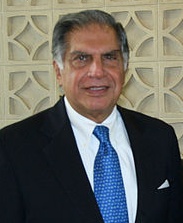Globe-striding Tata may be India's industrialist of the year
31 Dec 2009
 Though Reliance Industries boss Mukesh Ambani runs India's largest private business conglomerate, is the country's richest citizen, and has also been ranked as the world's fifth-best chief executive by the Harvard Business Review, it is Tata Group chairman Ratan Naval Tata who has captured the imagination of the media and corporate watchers.
Though Reliance Industries boss Mukesh Ambani runs India's largest private business conglomerate, is the country's richest citizen, and has also been ranked as the world's fifth-best chief executive by the Harvard Business Review, it is Tata Group chairman Ratan Naval Tata who has captured the imagination of the media and corporate watchers.
Much of his popularity is no doubt due to his genial presence and his greater accessibility to the media, where Ambani is almost reclusive in this regard. But it is also because Tata has proved his mettle since he took full control of the group in 1991, when he became chairman.
His first moves were to centralise control of the group's companies, raising many hackles among the 'old guard' of senior managers who were running the various units almost as private fiefdoms. He also moved to increase the parent group's shareholding in the companies, which it nominally owned, but in which its actual stake was small.
His larger ambitions began to unfold in the 'noughties', as he turned around some of the group's ailing concerns such as Tata Finance and Telco (now Tata Motor Co) and established the group's presence in new growth areas like telecommunications and information technology. Then he set about building a global empire.
His first overseas acquisition was the UK tea concern Tetly, which he bought at the start of the decade. In 2007, he bought the ailing European steel conglomerate Corus. But perhaps his most trying time came when Tata Motors bought luxury car brands Jaguar and Land Rover from Ford Motor Co early in 2009 - just before the economic downturn hit.
It is remarkable how Tata steered both Corus and more particularly JLR through the depression without having to accept any humiliating bailout from the UK government.




















